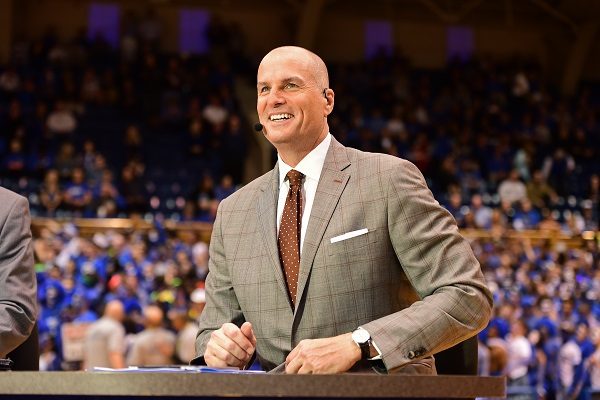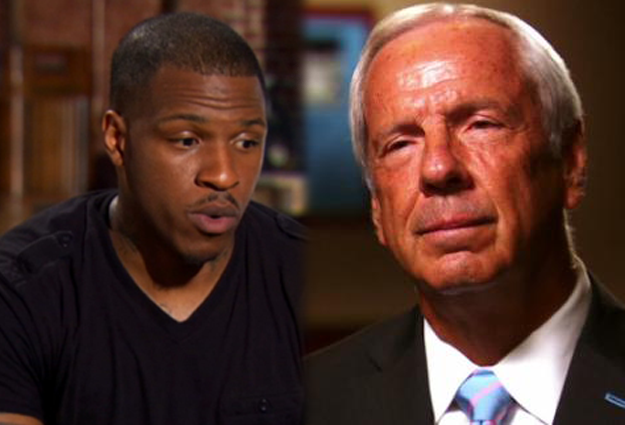CHAPEL HILL – The idea of paying collegiate athletes—it’s an idea that used to seem outrageous but may be a reality in the near future.
ESPN Broadcaster and Duke basketball alum Jay Bilas spoke at UNC last week during a college athletics roundtable discussion commissioned by Chancellor Holden Thorp. Bilas said that the concept of amateurism in college sports doesn’t work anymore and things need to change.
“College sports are professional. The only thing amateur about it is the structure and the leadership, and that the players don’t get anything,” Bilas said. “We’re not running this like the business it is. This is a multi-billion dollar business and we’re not running it the right way.”


Bilas speaks to panel
“I have considered it for a long time to be immoral to restrict athletes from getting more than just a scholarship when we don’t have a reason for doing so,” Bilas said. “It’s a conceptual problem, and I think it’s a moral problem.”
Bilas said paying college players would be expenses incidental to a multi-billion dollar industry.
“Money is not the issue with regard to athletes, because we’ve got professional athletes that are playing and we don’t see major problems,” Bilas said. “The problem is the restriction we have keeping athletes from receiving money.”
He said he believed a pay-for-play model needs to be instituted because Division I men’s basketball and football are professional enterprises.
He also argued that it’s not right that college athletes can’t cash-in on endorsements and said they have a right to support themselves and their families.
Bilas cited the example of 4-time Olympic gold medalist Missy Franklin.
She accepted an athletics scholarship to the University of California at Berkeley. To keep her NCAA eligibility, she can’t receive any endorsements. Bilas said he believes it’s not right that she has to lose out on millions of dollars in potential income.
Additionally, the court’s attention is focused on former UCLA basketball player Ed O’Bannon’s lawsuit against the NCAA for using his likenesses for profit with out compensation.
The fall-out of the lawsuit could be tremendous, though it wouldn’t be immediate. We could see retroactive payments of former and current student athletes and the larger implication of throwing out the old college athletics business model all together. Game-makers, like EA Sports, could get out of the college business completely if they have to start paying royalties to athletes.
“Think about it this way: the athlete is the only person in the university community that is restricted from compensation beyond expenses—the only person,” Bilas said.
The harsh restrictions placed on college athletes, Bilas explained, have caused too many dealings with unauthorized agents too go “under the table.”
The NCAA should lift the restrictions and bring transparency back to the process, he said.
“It has created an underground economy. It has created scandals that really don’t need to be scandals.”
And UNC has felt the blow of scandals over past two years, all beginning with a tweet by former UNC football player Marvin Austin. The tweet drew attention to Austin’s lavish lifestyle—and ultimately an NCAA investigation of the university’s football program. This subsequently surfaced “irregularities” in the African and Afro-American Studies Department.
“The NCAA has been in crisis mode since 1906 when it was founded,” Bilas said. “It was founded in scandal. It has continued in scandal and will stay in scandal unless there’s change in the way the rules are structured and the way that the governance is structured.”
Chapelboro.com’s Art Chansky has covered college sports since 1970. He agreed with Bilas that it’s not just “amateur” sports any more and things need to be rectified.

Chansky speaks to panel
“Well there’s no question that there are big changes coming in college athletics,” Chansky said.
“It’s already started with the realignment and eventually I believe it’ll be one super-division of the NCAA that will re-write its own rule book.”
Chansky said there are many issues, though, that may come about if players are paid. Will the non-profit NCAA lose it tax its exemption? What about workers’ compensation?
“And I think it will start maybe on an experimental level,” Chansky said. “I would like to see the ACC take the front position on that and test out a certain pay-for-play scale.”
Bilas posed the question: “How would we pay the wrestler versus the star quarterback? Should we provide the men and the women the same thing?” His answer was a free-market system.
Though NCAA president Mark Emmert has adamantly argued against paying players, the topic is not going away. As Chansky said, the climate of college athletics has already begun to change.






Comments on Chapelboro are moderated according to our Community Guidelines